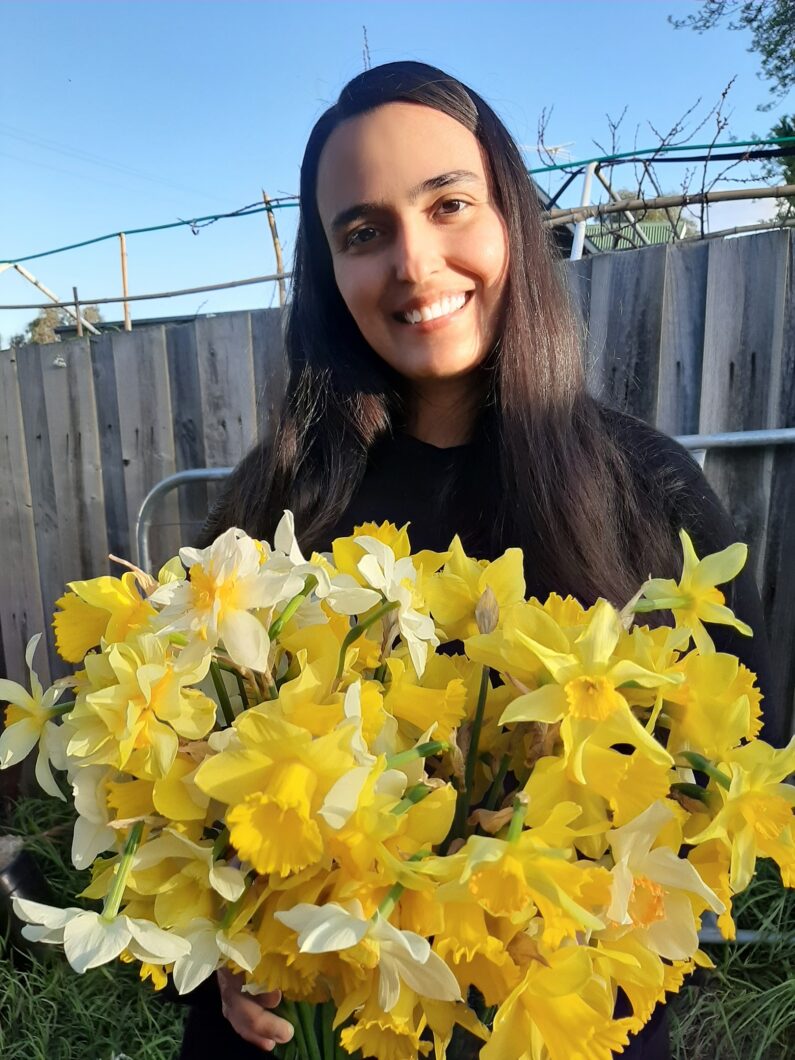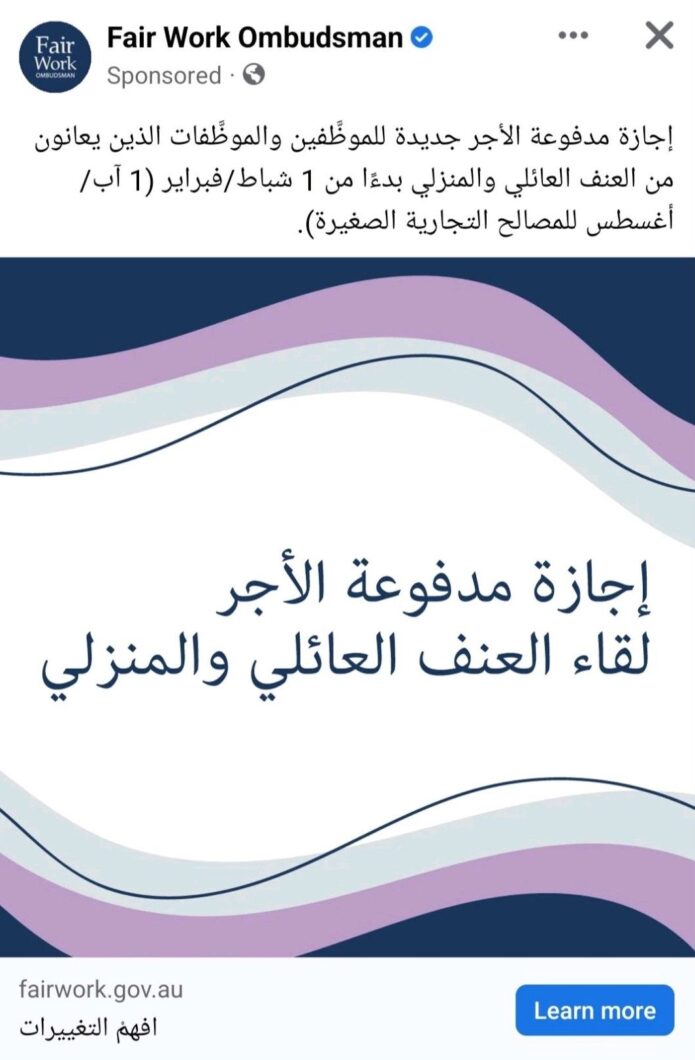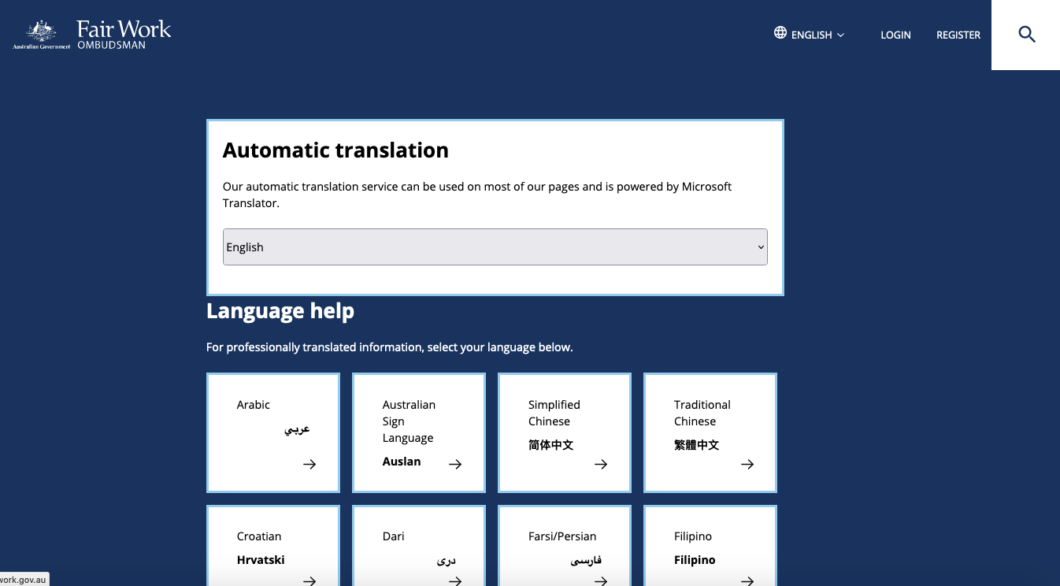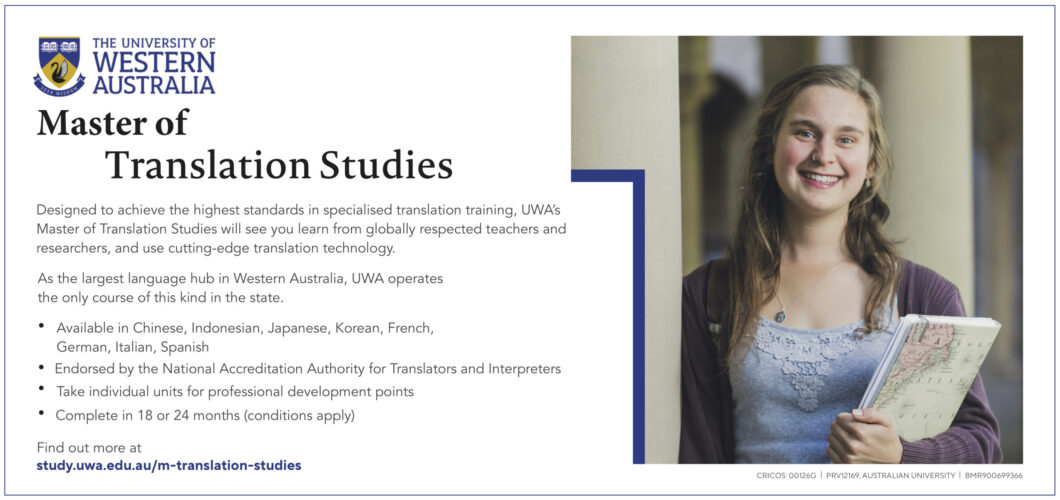QUALITY ASSURANCE

English>Arabic translator Bayane Abou Saada has a folder of screenshots on her phone dedicated to poorly translated ads, some of them minor. But when a recent mistranslation posted by the federal Fair Work Ombudsman (FWO) on their own website caught her eye, she says it ‘really got on my nerves’, and her subsequent post on LinkedIn sparked a debate around the need for quality assurance and accountability in translation. Here are some excerpts from that debate.
‘… horrifying to read … Unacceptable and borderline harmful.’
Back-translating the FWO’s statement, Bayane reads:
‘Paid leave for committing domestic violence.’
Turning to LinkedIn, she posts a screenshot of the statement (see screenshot) and asks:
Do people who commit domestic violence get paid leave now?!?
Pretty shocking, right? Well, I was a bit horrified too when I read the FairWork Ombudsman ad in Arabic in my Facebook feeds.
One thing is for sure, the Fair Work Ombudsman is definitely NOT rewarding domestic violence acts. In fact, [its] purpose ‘is to promote harmonious, productive, cooperative and compliant workplace relations in Australia’. It also supports employees who are victims of family and domestic violence by offering them paid leave.
However, the Arabic translation … is conveying a totally opposite meaning …
To avoid such mistakes in projects aiming to communicate important information to CALD communities, Bayane says, we need:
… quality assurance carried out by highly qualified and culturally aware translators in addition to educated community members.
She goes on to caution:
The use of Machine Translation can lower the overall costs, but detract from your message and damage your credibility.

Eman Al-Dasuqi, a health promotion officer working with migrant and refugee women, describes the ‘translation’ as:
… horrifying to read … Unacceptable and borderline harmful.
AUSIT past president Sam Berner comments:
I have seen a few posts on social media making fun of this ad already. Texts along the lines of ‘if you need a holiday, have a fight with your missus’ …
Of course, Australian Arabs are not the only ones reading this. Good image of Australian values is being hung out for the world to see.
Sam goes on to say:
The disregard that organs of the Australian Government show to CALD communities … [is] borderline racism.
One commentator counters Bayane’s criticism, stating that the word ‘لقاء’ doesn’t mean committed, but Bayane explains:
The word ‘لقاء’ by itself does not mean ‘committed.’ However, when you read the whole sentence, the meaning is distorted.
If you check dictionaries, the word ‘لِقَاء’ means literally ‘in return for’ ... and ‘in return for’ can be defined as ‘a reward for something’ … which is why the usage of ‘لِقَاء’ here can imply that the paid leave is a reward for committing DV.
I am sure you know the importance of paying attention to the meaning of the text as a whole to avoid poor grammatical structures and meaning distortion.
You can practically see Sam Berner throwing up her hands as she resorts to capitals, adding:
Precisely why people without ONGOING training AND certification, not just one or the other, should not translate for the public. I could say a few things in Arabic, but I will practise self-restraint.
Along with Bayane, several commentators assume that machine translation is involved in the error, and indeed a drop-down on the FWO’s home page offers what it calls ‘Automatic translation’ in 33 languages other than English (see screenshot – surely what they are offering is actually links to pre-prepared texts, not on-the-spot translation).
Image: links to ‘automatic translation’ on the Fair Work Ombudsman’s website

However, the FWO responds to Bayane, saying:
Thank you for bringing this matter to our attention. We can confirm that the text on the post you have referred to was translated using a professional NAATI-accredited translator and checked by a 2nd NAATI-accredited translator. We will continue to assess this issue and will cease promotion of the posts to avoid any confusion for customers while we do so. If you would like to discuss this with us further …
… and giving her an email address in case she would like to discuss the matter further.
Bayane thanks them, stating:
I have a strong faith in the role “Fair Work Ombudsman” plays in ensuring everyone has access to information and resources no matter where they are from or which language they speak.
It is disappointing to know that this was approved by two NAATI-certified translators.
I will be definitely reaching out to discuss this matter with you in private …
The fact that two NAATI-certified translators were involved leads commentators to question what else should be done going forward, to prevent mistranslations on serious issues such as this.
Costa Vasili, CEO and Founder of Ethnolink, comments:
I bet that the translation supplier does not hold ISO 17100 certification for Translation Services, and that the supplier was chosen based on having the cheapest price.
… while Ismail Akinci, CEO of All Graduates Interpreting & Translating, says:
I have always advocated that translations produced for public consumption must not be anonymous, i.e. both the translator and LSP should be known. This will mitigate against sloppy work!
… and Sam Berner concurs:
Can we keep saying this LOUDER, Ismail?
Superannuation specialist REN R suggests:
Maybe include a check by a non-NAATI person to determine that the translation meets the message correctly, post translation and before publicly publishing it. Think community leaders.
The various recommendations above, if all routinely implemented, would surely go a long way toward preventing such serious mistakes. To summarise:
- adequate certification (NAATI, and possibly also ISO)
- ongoing professional development (ideally including specialist areas)
- post-translation quality checking by a second translator, and possibly also by a suitable non-T/I member of the target community
- accountability of the translator(s) and agency responsible for the translation: no anonymity.
Bayane‘s last words on the matter are:
Quality assurance should be a key component of every translation project aiming to communicate important information to CALD communities.
. Bayane Abou Saada is an English>Arabic translator and project manager. She is passionate about literature, public health, science and exploring different cultures. In addition to a degree in translation she holds a BSc in biology, and is currently studying for a master’s degree in public health.
ADVERTISEMENT:



